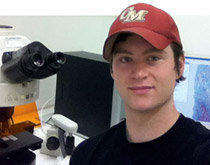
Brendan MacNabb, a biological sciences major, tends to spend his Saturdays playing baseball with his Carnegie Mellon teammates. This day, however, the star pitcher is in one of Pittsburgh’s neighborhoods, climbing stairs to enter an old stone building. It’s reminiscent of a church but serves as the headquarters for Pittsburgh Action Against Rape, a private non-profit organization dedicated to preventing rape and assisting rape survivors. MacNabb, along with about 20 other university volunteers, is greeted by a member of the organization, who leads them to a room where they are shown two short films depicting common scenarios that can lead to rape.
The viewing is all part of Carnegie Mellon’s annual day of service, called 1000plus, which began in 2008. Students, faculty members, and alumni—more than 1,000 participants in all—travel to different sites around the Pittsburgh region and volunteer their time. It’s no coincidence that, for the fifth year, Carnegie Mellon has been named to the President’s Higher Education Community Service Honor Roll by the Corporation for National and Community Service and the U.S. Department of Education. Annually, more than 5,000 Carnegie Mellon students spend about 150,000 hours engaged in community service.
MacNabb, who will earn his undergraduate degree in 2014, lends a hand whenever possible. He volunteers his time teaching English to a family from southeast Asia through FORGE, a CMU group that provides help to refugees in Pittsburgh. When he heard about 1000plus, his toughest decision wasn’t whether to get involved, it was where to help out. Other choices included:
- Adult Education & Literacy
- Animal Support
- Children & Youth
- Community Events/Enrichment
- Disaster Relief
- Health & Wellness
- Environmental Protection/Preservation
- Homelessness & Hunger
- Renovation–Revitalization–Repair
- Senior Care
Pittsburgh Action Against Rape was his final choice, in part because preventing date rape could keep classmates out of harm’s way.
After viewing the videos, the volunteers are asked to create their own public service announcement. MacNabb and his group create a skit situated at a party. It deals with the issue of verbal consent and shows different ways for dates to say no, how to avoid risky situations, and how to “rescue” a friend in trouble. The performance was recorded for use as an educational aid that will be circulated among universities throughout western Pennsylvania.
—Paul Carboni (DC’13)



